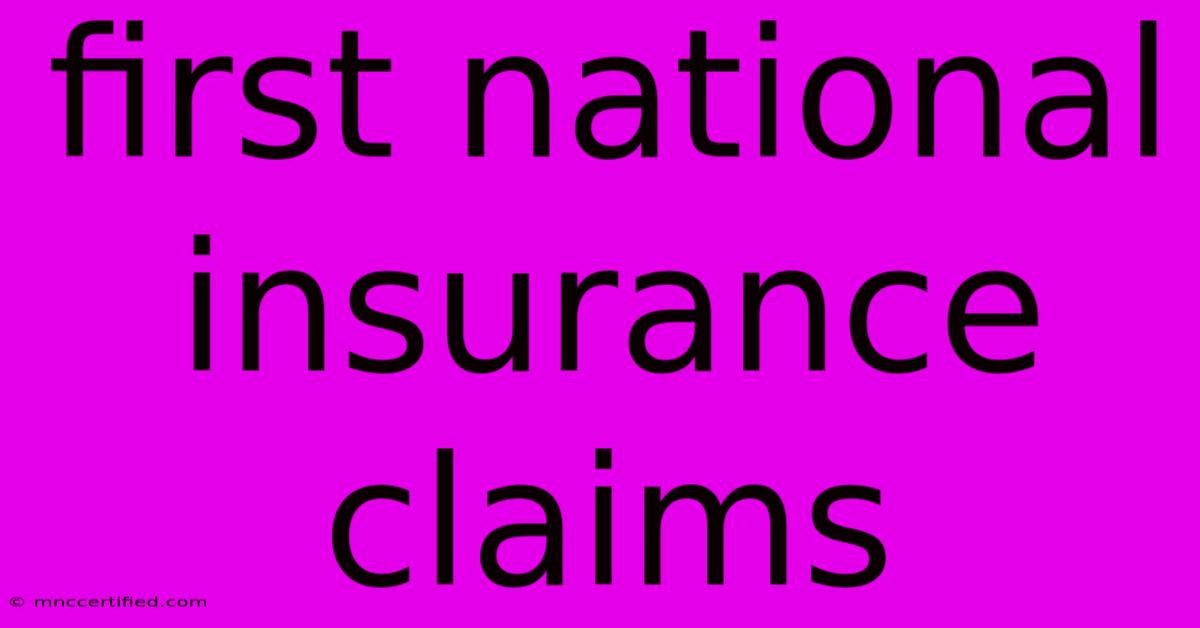First National Insurance Claims

Table of Contents
Navigating First National Insurance Claims: A Comprehensive Guide
Filing an insurance claim can be stressful, but understanding the process can ease the burden. This guide focuses specifically on First National Insurance claims, walking you through each step to ensure a smoother experience. We'll cover everything from understanding your policy to appealing a denied claim.
Understanding Your First National Insurance Policy
Before filing a claim, thoroughly review your First National Insurance policy. Knowing your coverage limits, deductibles, and exclusions is crucial. Look for specific details regarding:
- Covered perils: What events does your policy cover (e.g., fire, theft, wind damage)?
- Exclusions: What events are specifically not covered? This is often a source of confusion and claim denials.
- Deductible: The amount you're responsible for paying before your insurance coverage kicks in.
- Policy limits: The maximum amount your insurer will pay for a covered loss.
Types of First National Insurance Claims
First National likely offers various insurance products, each with its own claims process. Common types include:
- Homeowners Insurance Claims: These cover damage to your home and belongings due to covered perils. Documentation of damage is vital.
- Auto Insurance Claims: These handle accidents, theft, or damage to your vehicle. Police reports and witness statements are often necessary.
- Renters Insurance Claims: Similar to homeowners insurance, but for renters' possessions and liability.
- Commercial Insurance Claims: Claims for businesses, encompassing various types of coverage depending on the policy.
Step-by-Step Guide to Filing a First National Insurance Claim
-
Report the incident promptly: Contact First National immediately after an incident occurs. The sooner you report, the faster they can begin investigating.
-
Gather necessary documentation: This varies based on the type of claim but generally includes:
- Policy information: Your policy number and details.
- Personal information: Your contact details and address.
- Proof of loss: Photos, videos, and repair estimates for property damage claims.
- Police reports: For accidents or theft.
- Witness statements: If applicable.
-
File your claim: You can usually file a claim online through their website, by phone, or by mail. Follow the instructions provided on your policy documents or the First National website.
-
Cooperate with the adjuster: A claims adjuster will investigate your claim. Be prepared to answer their questions truthfully and provide any requested documents.
-
Understand the claim process: Be aware that the investigation and processing of your claim will take time. Regularly check the status of your claim with First National.
-
Review your settlement offer: Once the investigation is complete, First National will make a settlement offer. Review it carefully to ensure it accurately reflects your losses.
Appealing a Denied First National Insurance Claim
If your claim is denied, don't give up. You have the right to appeal. The appeal process typically involves:
- Review the denial letter carefully: Understand the reasons for the denial.
- Gather additional evidence: If you believe the denial was unjustified, collect more supporting documentation.
- Submit a formal appeal: Follow the instructions provided in the denial letter for submitting an appeal. Clearly state your reasons for contesting the denial.
- Consider legal counsel: If your appeal is unsuccessful, you might want to consult with an attorney.
Tips for a Smooth Claims Process
- Keep accurate records: Maintain detailed records of your policy, correspondence with First National, and all supporting documentation.
- Be honest and transparent: Provide accurate information to the claims adjuster.
- Communicate clearly: Keep open communication with First National throughout the process.
- Be patient: The claims process can take time.
By following these steps and understanding your policy, you can navigate the First National Insurance claims process effectively and hopefully receive a fair settlement. Remember to always consult your policy documents for the most accurate and up-to-date information. This guide provides general advice; specific procedures may vary. Always contact First National directly with any questions or concerns.

Thank you for visiting our website wich cover about First National Insurance Claims. We hope the information provided has been useful to you. Feel free to contact us if you have any questions or need further assistance. See you next time and dont miss to bookmark.
Featured Posts
-
Barbara Taylor Bradford 91 Years Old Passed Away
Nov 26, 2024
-
Steam Deck Sale Extended 33 Off
Nov 26, 2024
-
Ronaldo Double Leads Al Nassr
Nov 26, 2024
-
Champions League Matchday 5 Probable Lineups
Nov 26, 2024
-
Court Hearing Menendez Brothers Together
Nov 26, 2024